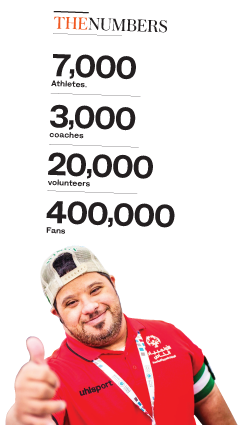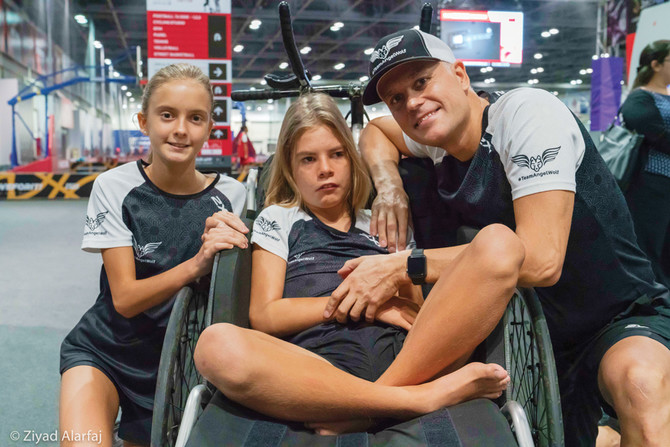DUBAI: Organizers of the 2019 Special Olympics have been raving about the lasting legacy the global competition will leave for the UAE — and the wider region — when it becomes the first Arab country to host the “largest sports and humanitarian event in the world.”
With less than a year to go to the Special Olympics World Games Abu Dhabi 2019 — where 7,000 athletes and their families from 170 countries will compete — the UAE Special Olympics in Dubai hosted a six-week summer camp with the aim of integrating people with intellectual disabilities using sport.
At the camp, which ran until Monday, international coaches and athletes including Egyptian professional triathlete Omar Nour and Emirati Olympic figure skater, Zahra Lari, trained and mentored young children with intellectual disabilities in sports, including cycling, basketball, football and track running.
Dr. Yousef Al Hammadi, chief intelligence officer at Special Olympics World Games Abu Dhabi 2019, said the six-week camp was a great example of how sport brings society together with “people of determination” — an alternative label for those with special needs that the UAE is championing throughout the host of activities, which aim to promote inclusivity in sports, ahead of the Special Olympics next March. 
“We are trying to reach a broader audience and further raise awareness of people with determination — and, in particular, people with intellectual disability — as Abu Dhabi and the UAE prepare to host the Special Olympics World Games, which will be the largest sports and humanitarian event in the world in 2019 and the biggest event in the history of the UAE,” said Al Hammadi.
“It forms part of our mission of spreading awareness and inclusion, the message of how we are integrated in one system, one country, one nation, and of how we are globally working toward a more open and inclusive world for everyone. This demonstrates the positive impact that next year’s Special Olympics World Games will have on the UAE.”
Al Hammadi said that it was a coup for Abu Dhabi to be chosen to host the Special Olympics World Games on the first time it has taken place in the Middle East.
A “rollercoaster” of preparation is now under way in the build-up to the event, as Al Hammadi explained.
“Our planning team are on a very tight plan,” he said. “Making sure we host an event that caters for more than 7,000 athletes, 3,000 coaches, 20,000 volunteers, and more than 400,000 fans — plus the global online fans — is very challenging, but I think we are up to the game and everyone is very excited.
“One of our biggest goals of hosting the Special Olympics World Games is ensuring we leave a legacy, and we have a whole department that is looking after this aspect alone: The legacy of the Games; what stays in the region and in the world after the event.”
He said that this would involve building a first-of-its-kind online databank of knowledge about “people with determination,” and using this information to shape policymaking for the special needs community.
Dr. Abdulla Al Karam, chairman of the board of directors and director general of the Knowledge and Human Development Authority (KHDA), was one of those taking a hands-on approach during the six-week summer camp.
He shot hoops on the basketball play area and kicked a ball with the children on the indoor football turf. Speaking on the sidelines of the final day of the camp at Dubai World Trade Center, he said: “This has been a key event that has sent a message to the community that in anything we do — even sport — inclusion is very important.
“It is very important to us that events like this happen ahead of the Special Olympics in Abu Dhabi. These events normally take place in developed countries, this event being held in the Middle East for the first time will show we have a lot to offer. It will open the door for the event to be hosted elsewhere in the Middle East.
“There has been a lot of work to promote the inclusion of people with determination in the UAE and the region, but we haven’t had the platform yet to bring that to the rest of the world — and what better way than through sport? Being active makes for a happier life.”
The camp’s final day on Monday included a five-a-side football tournament with volunteers, Special Olympics UAE ambassadors and members of the Local Organizing Committee (LOC) playing alongside participants.
Young people from centers such as SEDRA, Al Noor and Manzil in Dubai spoke of how the summer camp has inspired them to embrace sport.
Mohammad Chandra, a 13-year-old with intellectual disabilities, was buzzing after attending the summer camp.
“The experience has been so spectacular,” he said. “I have been doing basketball, football, cycling — I also did some archery which was my favorite. I have so enjoyed it. It’s been a great experience and I made new friends.”
For Nour, a Special Olympics ambassador, the attitude of the young participants has been inspiring.
“This summer camp is focused around athletes of determination. It has been fantastic to see so many people come together to help and coach these young people, (it’s) what sport is all about,” he said. “The energy was raw, it was genuine, it was pure.”
Nour has wholeheartedly embraced his role as an active ambassador for the Special Olympics World Games Abu Dhabi 2019, which takes place next March.
“My role is to use the profile I have built over the years and try and promote the cause,” he said, “because I believe in that cause — for fully-abled people, and for people with determination. I believe in the power of sports.”
Nour explained that at the age of 29 he weighed 105 kilos and never played any sports. He turned his life around by signing up for this first ever triathlon. Just two years later, he earned his pro-card and started his professional triathlon career.
“I believe in the power of change, the power of sports and the quality of life it brings to everybody,” he explained. “So when you bring these world-class games to Abu Dhabi — and the Arab world — it inspires generations.
“Bringing the biggest championship of its kind in the world here will be contagious for kids. They will see these athletes and think ‘I want to do that’, ‘I can do that’.”
Abdalkader Mustafa, a 14-year-old Dubai school pupil, was one of the volunteers helping children embrace sport at the summer camp.
“We have been helping the children of determination to play and get involved in the sports — and show some love, respect and support really. We have been doing loads of games: Cycling, running basketball, football — all the kids have been so happy. You can see it from their faces.”
British former Royal Marine and fitness expert Nick Watson, who lives in Dubai, knows all too well what it is like to show young people with determination the power of sports.
Watson participates in races, obstacle competitions and triathlons while pushing his 14-year-old son Rio — who has a rare chromosome disorder that affects his speech and motor skills — using a specially designed chair.
“Anything to help spread awareness about children with determination — especially toward the Special Olympics next year — is very important, not only locally but here for the region, to make sure society comes together with those that have disabilities. Sports is very special as it really helps break down barriers,” he said. “Everyone, whoever they are, at the start line of a race has a story to tell or is there for a reason and disabilities just disappear.
“Everyone who has come to this event understands that sport should be part of the community for everyone.”
Watson said that he believed the Special Olympics would be “fantastic” for the region, where he has raised his son for the past seven years. “During that time we have seen leaps forward in terms of change for people with determination. And I think the most important thing is that the Special Olympics leaves a legacy, that it leads to change in the future.”
















